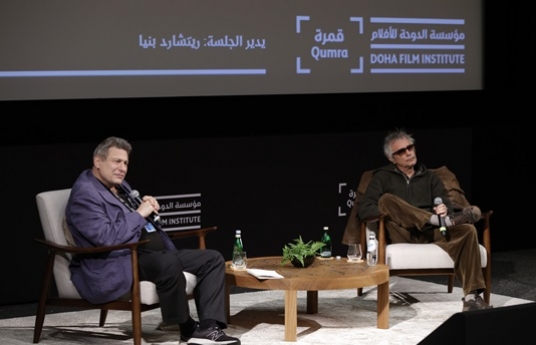Reinventing the Power to Amaze is the Vision, Joy and Hardship of Making Films: Qumra Master Leos Carax
Mar 04, 2024

Doha, Qatar; March 4, 2024: Qumra Master Leos Carax, the French auteur whose films defy the conventional boundaries of narrative and style, said the vision, joy and hardship of filmmaking is to reinvent the power to amaze people.
At his Masterclass at the tenth edition of Qumra, the annual talent incubator event for emerging Arab and international filmmakers by the Doha Film Institute, Leos said cinema is reinvented every so often. “Cinema is the only art that needs a machine. From silent to sound, from black & white to colour… and each innovation is reinventing film.”
Leos said the first moving images – Arrival of a Train at La Ciotat (1895), which depicts a train pulling into a station, shocked viewers when they saw it. “Today, it would bore even children because they would have watched 20 Spiderman movies already.”
In his ever-evolving directorial career, he went on to direct a musical, Annette (2021), which he said probably follows his life-long love for music and won him the Best Director at Cannes Film Festival. “The most beautiful life is life in music,” he observed, adding that as a child, “music rejected me because I wasn’t good. I always had this wish to be part of music.”
Leos’s legendary collaborations have been with actor Denis Levant and the late cinematographer Jean-Yves Escoffier. He and Levant went on to make some of the most seminal works in modern cinema, including Holy Motors (2012), a surreal tale in which Denis plays diverse characters – from a limo driver to an old woman beggar to a gangster.
The two are currently collaborating on It’s Not Me, a self-portrait by Leos, for which he digs into his films and archival footage. “I learnt editing for the film. It is very hard in the beginning – because you are editing what you filmed. I love it now. The magic of editing grows on you and little by little, and soon you don’t care. You put images together and find something new.”
Leos said he has not studied filmmaking formally but working for a film magazine, when he was just a teenager, opened doors for him to travel to film festivals and meet the great actors and directors of the time. He started imagining films but couldn’t get the money for a feature film. His first film was a short that went to festivals, which made it easier to secure funding for Boy Meets Girl.
“What I have realised is that without the few people [with whom he collaborated], I would not have been able to make films at all,” said Leos. His own approach to filmmaking, in his initial days, “was to imagine the film for someone – may be an actor or my friends. All my films were imagined for them.”
Leos says cinema is “a toy you can play with” – and that inherent sense of play and experimentation continues to drive him as a filmmaker who amazes viewers with extraordinary frame compositions that prevail over the passing of time.